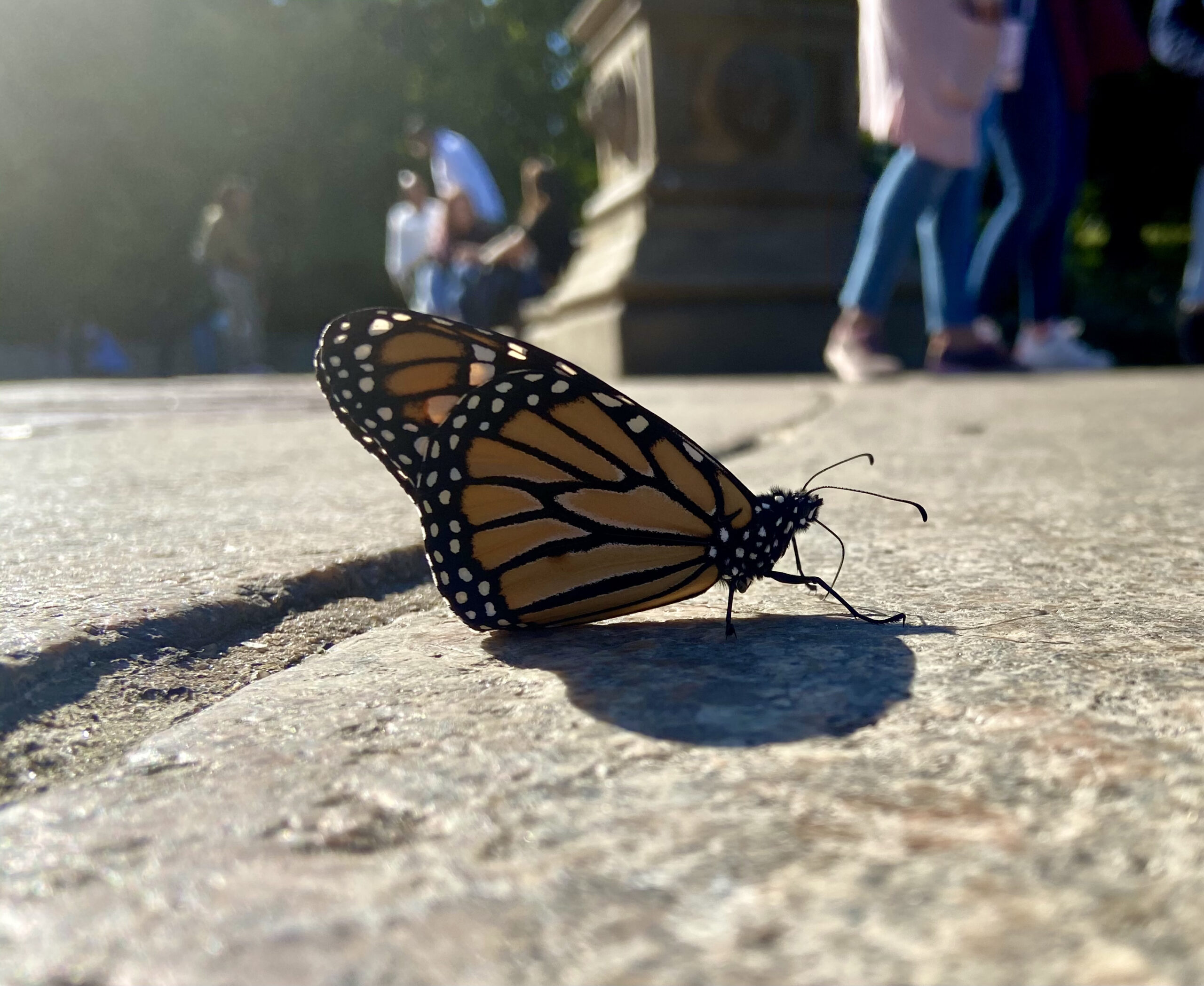Ga. Monarch Butterflies Struggle With Climate Change

A monarch butterfly rests during the journey back to its overwintering grounds in Central Mexico.
Aaron Tremper / WABE
Georgia residents can expect to see monarch butterflies two times during the year: in the spring, when the orange and black insects lay their eggs all over the state, and in the fall, when adult butterflies make a pitstop during their 3,000-mile journey back to their overwintering grounds in Mexico.
But starting in the mid-’90s, researchers noticed that monarchs were struggling. Elise Zipkin, a quantitative ecologist at Michigan State University, says glyphosate weed killers like Roundup were killing the milkweed plants the butterflies needed to lay their eggs.
“But since the mid-2000s, the amount of glyphosate application rate has stayed pretty steady,” she says. “And the monarchs have still declined.”
So Zipkin set out to find out why.
She and her team used over 18,000 surveys conducted between 1994 and 2018 to test different reasons behind the insects’ decline. The resulting study published in the journal “Nature Ecology & Evolution” has been making waves in the butterfly community.
The scientists found that climate change is the biggest contributing factor behind recent drops in eastern monarch butterfly populations. Their findings suggest that climate changes seen in the butterflies’ spring breeding grounds are contributing to their decline.
The data showed that from 2003 to 2018, climate and weather conditions in monarch breeding grounds were around seven times more important than other factors in contributing to summer populations.
The study focused on the Midwest. But for the millions of monarchs visiting Georgia in April and early May to lay their eggs, climate is crucial too.
“Those spring conditions are super important,” says University of Georgia ecology professor, Sonia Altizer. Altizer specializes in animal migrations and even graced the Ted Talks stage in 2015 to talk monarchs.
Altizer says monarchs are finicky insects that are particularly sensitive to rainfall. Factors like temperature and precipitation can not only affect the butterflies themselves but also how much milkweed is available.
“They need rainfall for the plants to grow,” says Altizer. “But then too much rain also is not good.”
A federal climate study in 2018 found that extreme rainfall events have been increasing in the Southeast.
For Altizer, Georgia is a small, understudied part of the butterflies’ spring breeding grounds, which spans across most of the Southeast. A 2017 study published in “Global Change Biology“ found that about 1 in 12 monarchs that make it to Mexico in any given year started their journey from the Southeast. While that may not sound like a lot, it can make a difference to a species already in decline.
“We need to look at what’s happening in areas beyond just Texas and the Midwest, which have received most of the attention,” says Altizer.
States like Texas and Oklahoma are considered prime real estate in monarch circles, due to the states’ peak placement along the butterflies’ migratory route.
“Texas is considered to be the most important state in the springtime for monarchs,” says Ray Moranz, a pollinator ecologist with the Xerces Society for Invertebrate Conservation. “So many monarchs that spent the winter in Mexico go through Texas on their way to the rest of eastern North America”
The—literally—continental size of the monarch’s multigenerational journey makes it hard for scientists like Morenz and Altiver to cover enough ground to study the monarch’s entire territory. Because of this, community scientists have become one of the biggest sources of data on monarchs nationwide, and their contributions end up informing published studies.
Community scientists who report sightings to projects like Journey North and Monarchs Across Georgia are helping uncover another consequence of climate change on monarch populations—overwintering hundreds of miles north of their usual winter territory in Mexico.
Last year, researchers at the Georgia Department of Natural Resources, University of Georgia, Monarchs Across North America and Journey North recruited the public to report butterfly sightings throughout the winter. Some evidence published in previous studies suggests that monarchs may be staying along the Gulf Coast and in the Southeast for the winter instead of heading back to Mexico.
“There’s evidence that they are overwintering as if they were in Mexico,” says Susan Meyers, the Pollinator Habitat Restoration grant administrator for Monarchs Across Georgia. “In that state of reproductive diapause, where they’re not sexually mature.”
Experts say one of the best ways for Georgians to help monarchs is to plant native varieties of milkweed. Tropical milkweed, which has become a favorite among cultivators for its looks and ability to grow year-round, can encourage monarchs to overwinter and cause outbreaks of a protozoan parasite responsible for physically maiming butterflies.
For study author Elise Zipkin, another report suggesting climate change’s increasing toll on our planet can feel overwhelming. But she finds that it prepares others with solutions to intervene now rather than later.
“Sometimes it can feel overwhelming that we’re finding out more about how the effects of climate change are leading to the decline of the species,” says Zipkin. “But I look at it from a really helpful perspective. By finding out this information, there’s a lot that we can actually do about it.”








